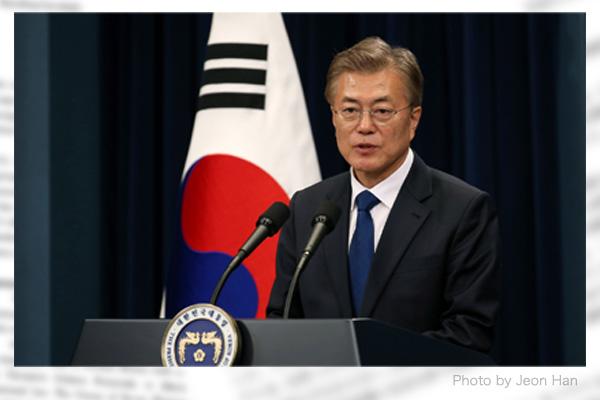On August 2, when Japan decided to drop South Korea from a list of the countries subject to preferential trade treatments, South Korean President Moon Jae In blamed Japan for causing an “unusual diplomatic and economic situation” at the outset of an extraordinary cabinet meeting he convened. However, his argument twisted facts and distorted the interpretation of international law.
Mr. Moon concluded the Japanese action as a “clear trade retaliation against the South Korean Supreme Court’s rulings on forcefully requisitioned laborers” in Japan during the war and as “clearly designed to attack the South Korean economy and interrupt its future growth.” As the Japanese government has reiterated, however, its action represents the termination of preferential treatments for the reason of a decline in the South Korean government’s credibility regarding strategic goods export controls, rather than any retaliation or any intent to attack the South Korean economy. The Japanese action deprived South Korea of preferential treatments that it had enjoyed along with the United States and some European countries, while leaving South Korea still more preferred than Taiwan and some other economies.
Rapid increase in illegal exports of strategic goods
Rapid increase in illegal exports of strategic goods under the Moon government was first taken up by Park Jeong, a lawmaker from the ruling Democratic Party of Korea. On October 10 last year, South Korean news agency Yonhap distributed a report headlined “24-fold growth in value of detected unauthorized exports of strategic goods in three years,” based on documents that the government submitted at the request of Mr. Park. The report said that the value soared 24-fold from $5.41 million in 2015 to $132.02 million in 2017, while the number of such detected export deals rose three-fold from 14 to 48. The report quoted Mr. Park as warning that illegal exports of strategic goods would directly or indirectly affect not only South Korea’s national security but also world peace and security. Even in 2018, the number of detected unauthorized exports stood at 41, indicating little improvement (The value in 2018 was $13.19 million. See my article in the September issue of Seiron monthly magazine for details). Furthermore, the Moon government has refused to have Japan-requested consultations on how to unearth illegal exports of strategic goods over the past three years.
President Moon criticized the Japanese action as running counter to international law and to mankind’s universal values of a ban on forced labor and democracy based on the separation of the three branches of government. However, the International Labor Organization Treaty to which Japan has been a party since the prewar period has admitted wartime labor mobilization as an exception to the ban. Japan’s Supreme Court has rejected all compensation suits by former Korean wartime workers. While Japanese and South Korean Supreme Court rulings have clashed, international law, in order to avoid such clash, has established the principle that treaties bind the whole of any treaty member including its judicial branch.
Moon attempting to topple diplomatic order
President Moon has also vowed not to sit still and watch assailant Japan to reverse right and wrong and make its point in a loud voice. However, international law requires countries to settle their war or dispute by concluding a treaty and refrain from raising past events in diplomatic relations after the conclusion. The Japanese government’s reiterated apologies and humanitarian measures represent its political considerations instead of its acceptance of responsibilities as an assailant. However, Japan can give no trust-based preferential treatment to the Moon government that attempts to topple the diplomatic order under which countries conclude treaties to settle their disputes. Japan has no choice but to treat South Korea as an ordinary country based on merit.
Tsutomu Nishioka is a senior fellow and a Planning Committee member at the Japan Institute for National Fundamentals and visiting professor at Reitaku University. He covers South and North Koreas.


